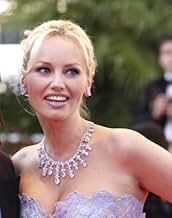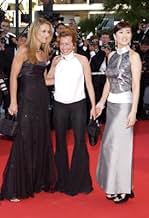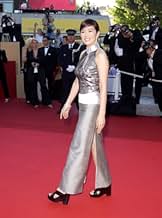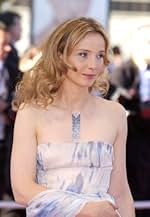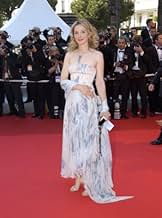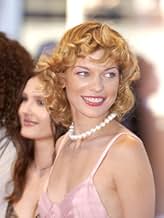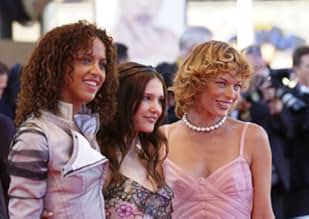IMDb RATING
6.4/10
1.3K
YOUR RATING
Rosanna Arquette talks to various actresses about the pressures they face as women working in the entertainment industry.Rosanna Arquette talks to various actresses about the pressures they face as women working in the entertainment industry.Rosanna Arquette talks to various actresses about the pressures they face as women working in the entertainment industry.
- Director
- Writer
- Stars
- Awards
- 1 nomination total
- Director
- Writer
- All cast & crew
- Production, box office & more at IMDbPro
Featured reviews
I started out liking this film. Ms. Arquette was making some good points, talking to some very interesting actresses (Jane Fonda is a standout, as well as Debra Winger herself.) But this film could have easily been 20 minutes shorter--it just seemed to go on and on. In the end, when all of the actresses involved in the documentary are signing their names in lipstick on pieces of mirror (huh?), Rosanna is the very last one to do it. It just hit the point that this was such a vanity piece rather than a serious piece of filmmaking, which it really could have been, if someone else had directed it that is.
I just want to thank Rosanna Arquette for what was one of the most intriguing documentaries about Hollywood I've seen. Although I live in Los Angeles, I do not work in the film industry, and in general tend to feel as though we, the citizens of the Movie Capital of the World, are frequently over-inundated with media about actors and their films.
But SEARCHING FOR DEBRA WINGER is different. Despite what the reader may feel about Hollywood, the actresses interviewed are some of the most influential performing artists of our era. Through Arquette, we get an opportunity to sit down and have a frank chat about their art, their insights, their ambivalence. The doc is not like a Barbara Walters interview: predictable and formatted and PR-mediated. Interviewed by Arquette, a fellow actress with similar sympathies, over little dinner parties, in restaurants, on lawn chairs -- even in the ladies room (a goofy, then serious Frances McDormand) -- the actresses managed to be more frank, more casual, unguarded with their opinions. Some seemed suspicious that the little documentary would ever be aired at all -- inadvertently freeing them up to be even more honest.
Famous for their beauty, their talent and their projects, you get to see that they are intelligent, clever, funny, angry, uptight, resentful, self-conscious, generous, insightful, even visionary in ways that are only hinted at in their films. The dialogue in SEARCHING FOR DEBRA WINGER is all in the actresses own words: no scripts, no acting, no roles. Its an opportunity to see who they are, in all their brilliance, artistry, egotism and folly. Diane Lane is sharp as a tack. Alfre Woodard deeply reflective, eloquent and mature. My suspicion that Holly Hunter is a genius is confirmed. Theresa Russell cuts loose with quite a bit of rage. Whoopi Goldberg is the antidote to glamour-poisoning. Sharon Stone is at least as ballsy as her onscreen persona. Jane Fonda comes over as a wise and deeply generous doyenne. And Debra Winger is more compelling than she's been in any of her movie roles.
Perhaps the biggest revelation was Rosanna Arquette herself. She really puts herself out there, expressing her own insights, risking the exposure of her doubts, in a way that encourages the other actresses to feel comfortable, to open up, to speak frankly. Arquette gamely drops a lot of the pretensions of the industry to tell her story, and to get the other actresses to tell theirs, and as a result manages to reveal unexpected truths about the people behind the profession.
Because of all the big names, the documentary has star power, glamour, and charm in spades. But it has much more. With the lighting, hair and makeup aspect de-emphasized, one gets a glimpse of the real people underneath the monolithic illusion we know as Hollywood, and I found these people, these artists more fascinating than any scripted characters I've seen in quite some time. Underneath all the glittering surfaces, one discovers a deep, and untapped reservoir of artistic -- and human -- potential.
But SEARCHING FOR DEBRA WINGER is different. Despite what the reader may feel about Hollywood, the actresses interviewed are some of the most influential performing artists of our era. Through Arquette, we get an opportunity to sit down and have a frank chat about their art, their insights, their ambivalence. The doc is not like a Barbara Walters interview: predictable and formatted and PR-mediated. Interviewed by Arquette, a fellow actress with similar sympathies, over little dinner parties, in restaurants, on lawn chairs -- even in the ladies room (a goofy, then serious Frances McDormand) -- the actresses managed to be more frank, more casual, unguarded with their opinions. Some seemed suspicious that the little documentary would ever be aired at all -- inadvertently freeing them up to be even more honest.
Famous for their beauty, their talent and their projects, you get to see that they are intelligent, clever, funny, angry, uptight, resentful, self-conscious, generous, insightful, even visionary in ways that are only hinted at in their films. The dialogue in SEARCHING FOR DEBRA WINGER is all in the actresses own words: no scripts, no acting, no roles. Its an opportunity to see who they are, in all their brilliance, artistry, egotism and folly. Diane Lane is sharp as a tack. Alfre Woodard deeply reflective, eloquent and mature. My suspicion that Holly Hunter is a genius is confirmed. Theresa Russell cuts loose with quite a bit of rage. Whoopi Goldberg is the antidote to glamour-poisoning. Sharon Stone is at least as ballsy as her onscreen persona. Jane Fonda comes over as a wise and deeply generous doyenne. And Debra Winger is more compelling than she's been in any of her movie roles.
Perhaps the biggest revelation was Rosanna Arquette herself. She really puts herself out there, expressing her own insights, risking the exposure of her doubts, in a way that encourages the other actresses to feel comfortable, to open up, to speak frankly. Arquette gamely drops a lot of the pretensions of the industry to tell her story, and to get the other actresses to tell theirs, and as a result manages to reveal unexpected truths about the people behind the profession.
Because of all the big names, the documentary has star power, glamour, and charm in spades. But it has much more. With the lighting, hair and makeup aspect de-emphasized, one gets a glimpse of the real people underneath the monolithic illusion we know as Hollywood, and I found these people, these artists more fascinating than any scripted characters I've seen in quite some time. Underneath all the glittering surfaces, one discovers a deep, and untapped reservoir of artistic -- and human -- potential.
Roseanne Arquette's personal documentary has a really great idea: several dozen top Hollywood actresses from the 70's, 80's and 90's discuss the difficulties facing women in Hollywood, particularly women over the age of forty. Interviewing them one-on-one or gathering them together in discussion groups, Arquette elicits refreshingly frank, unsanitized criticisms and confessions from some of Hollywood's outstanding actresses and beauties: Jane Fonda, Holly Hunter, Daryl Hannah, Salma Hayak, Angelica Huston, Meg Ryan, Sharon Stone, and many others including Debra Winger (who looks fabulous). The title takes its name from the idea that Winger chose to leave Hollywood at the height of her career in the 80's (though a quick check on IMDb.com shows that the actress has actually worked continuously since then.)
Roger Ebert provides a plausible - though unchallenged - explanation for the lack of good roles for women in their 40's. The audience, he explains, is thought to be comprised of young men 14-24 years old who are disinterested in films about women who might be the age of their mothers. Salma Hayak proposes a solution: she suggests that it will take powerful Hollywood women - like the ones interviewed in this documentary - to create more interesting opportunities for mature women in film.
The lack of meaningful roles for women, particularly mature women is a worthwhile subject and naturally has implications far beyond Hollywood; but Arquette's inquiry is disappointingly shallow. The documentary neglects the broader issues of our obsession with youth and beauty and women's role in society focusing exclusively on the impact of aging on Hollywood stars. (The choppy, MTV editing style and amateurish camera-work don't do a lot to elevate the topic either. But those are minor annoyances.)
At its worst, the film disintegrates into a kind of group kvetch for the over privileged. And watching these beautiful, wealthy women preen in front of paparazzi, compare jewellery, schedule dinner dates and party plans then complain that they don't have enough time to spend with their kids, well, it's kinda hard to feel a ton of sympathy....unless you, too, just happen to be a gorgeous, wealthy forty year old movie star. The irony is there for all to see but is never acknowledged: most of these actresses have clearly benefitted from the system they're now deploring; in their twenties, weren't these actresses eclipsing the previous, aging generation? So the laments come off as self-serving.
Despite these disappointments, SFDW is worth a look for its candid interviews. Debra Winger, Whoopi Goldberg and Jane Fonda are particularly good. Recommend.
Roger Ebert provides a plausible - though unchallenged - explanation for the lack of good roles for women in their 40's. The audience, he explains, is thought to be comprised of young men 14-24 years old who are disinterested in films about women who might be the age of their mothers. Salma Hayak proposes a solution: she suggests that it will take powerful Hollywood women - like the ones interviewed in this documentary - to create more interesting opportunities for mature women in film.
The lack of meaningful roles for women, particularly mature women is a worthwhile subject and naturally has implications far beyond Hollywood; but Arquette's inquiry is disappointingly shallow. The documentary neglects the broader issues of our obsession with youth and beauty and women's role in society focusing exclusively on the impact of aging on Hollywood stars. (The choppy, MTV editing style and amateurish camera-work don't do a lot to elevate the topic either. But those are minor annoyances.)
At its worst, the film disintegrates into a kind of group kvetch for the over privileged. And watching these beautiful, wealthy women preen in front of paparazzi, compare jewellery, schedule dinner dates and party plans then complain that they don't have enough time to spend with their kids, well, it's kinda hard to feel a ton of sympathy....unless you, too, just happen to be a gorgeous, wealthy forty year old movie star. The irony is there for all to see but is never acknowledged: most of these actresses have clearly benefitted from the system they're now deploring; in their twenties, weren't these actresses eclipsing the previous, aging generation? So the laments come off as self-serving.
Despite these disappointments, SFDW is worth a look for its candid interviews. Debra Winger, Whoopi Goldberg and Jane Fonda are particularly good. Recommend.
I actually just read about this documentary in Entertainment Weekly, so was surprised to see it on Showtime tonight. I was ready to slam it for being shallow, but was pleasantly surprised at its refreshing insights.
Rosanna Arquette directs this documentary about the role of women in Hollywood when they are no longer a starlet; the effects of age on the actress' career. What was most impressive about the documentary was the incredible number of actresses interviewed. From Sharon Stone to Martha Plimpton, Holly Hunter to Charlotte Rampling the many actresses (both fairly obscure and mainstream) express some interesting views without sounding like they are complaining about the `lack of strong roles for women' a phrase that has become cliché. While I am not a fan of Salma Hayek in the least, she came across as very strong, voicing the need for female writers, directors, etc. (and backed up her word by doing that with Frida.)
Arquette's earthy style made the documentary flow very smoothly, and it was refreshing to see no pretensions. On many occasions, she very humbly expressed her adoration and respect for her subjects. She also put many of her interviewees together in groups which not only opened up the dialogue, but showed genuine camaraderie. Even Roger Ebert makes an appearance discussing how the movie going men tastes in movies have changed.
The one complaint I have is that I never really followed Arquette's vision. After listening to the amazing insights provided by actresses, I didn't see a clear correlation with the thesis.
Definitely worth a look, but definitely estrogen-laden so it may not be for all. But for someone who generally leans towards the `anti-Meg Ryan' films this was indeed interesting and thought provoking.
--Shelly
Rosanna Arquette directs this documentary about the role of women in Hollywood when they are no longer a starlet; the effects of age on the actress' career. What was most impressive about the documentary was the incredible number of actresses interviewed. From Sharon Stone to Martha Plimpton, Holly Hunter to Charlotte Rampling the many actresses (both fairly obscure and mainstream) express some interesting views without sounding like they are complaining about the `lack of strong roles for women' a phrase that has become cliché. While I am not a fan of Salma Hayek in the least, she came across as very strong, voicing the need for female writers, directors, etc. (and backed up her word by doing that with Frida.)
Arquette's earthy style made the documentary flow very smoothly, and it was refreshing to see no pretensions. On many occasions, she very humbly expressed her adoration and respect for her subjects. She also put many of her interviewees together in groups which not only opened up the dialogue, but showed genuine camaraderie. Even Roger Ebert makes an appearance discussing how the movie going men tastes in movies have changed.
The one complaint I have is that I never really followed Arquette's vision. After listening to the amazing insights provided by actresses, I didn't see a clear correlation with the thesis.
Definitely worth a look, but definitely estrogen-laden so it may not be for all. But for someone who generally leans towards the `anti-Meg Ryan' films this was indeed interesting and thought provoking.
--Shelly
The cast of this film is all women, mostly mature actresses, over 40 years old where Hollywood sees them as grandmothers. Despite the fact that they look great, they reach an age in the business where they are not considered at all and turned down for parts. Hollywood's biggest problem in this industry is the lack of roles about mature women by mature women for mature women audiences. I could see the frustration of having former leading ladies being turned into grandmothers before their time or put out to pasture. They still want to work and have a family if that is there goal. But working in this business is tough enough, you can win Academy Awards like Jane Fonda and Vanessa Redgrave and still be auditioning for roles. The gender gap in Hollywood is quite fierce where the women must be attractive and talent is secondary. Also the roles in the films are quite fierce for women. Yes, this documentary is a feminist but still female as well. This documentary shows how far behind Hollywood is in establishing equality for women in the business.
Did you know
- TriviaScreened as one of "out-of-competition" films at the Cannes Film Festival, May 2002. Director Rosanna Arquette says she made the documentary when she was struck by the fact that Debra Winger, who earned three Oscar nominations, had left the profession in her 30s.
- Quotes
Whoopi Goldberg: Longevity is everything. We have outlasted most of the people that used to hire us.
- Crazy creditsInstead of saying a Rosanna Arquette film, it says a Rosanna Arquette Experience and instead of saying Directed by, it says Experienced by Rosanna Arquette.
- ConnectionsFeatures Les chaussons rouges (1948)
- SoundtracksAny Day Now
(Guy Garvey / Richard Jupp / Craig Potter / Mark Potter / Pete Turner (as Peter Turner))
Performed by Elbow
Courtesy of V2 Records
- How long is Searching for Debra Winger?Powered by Alexa
Details
Box office
- Budget
- $600,000 (estimated)
- Runtime
- 1h 39m(99 min)
- Color
- Sound mix
- Aspect ratio
- 1.85 : 1
Contribute to this page
Suggest an edit or add missing content


